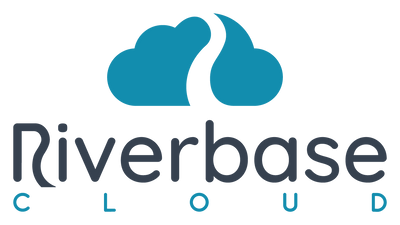The AI Revolution in Modern Marketing
AI marketing strategies are changing how businesses connect with customers, optimize campaigns, and drive growth in today's competitive landscape. If you're looking to implement effective AI in your marketing efforts, here's what you need to know:
- Data-Driven Personalization: Use AI to analyze customer data and deliver hyper-personalized experiences
- Automated Campaign Optimization: Implement AI tools that continuously improve ad performance and ROI
- Content Creation and Improvement: Leverage generative AI for creating and optimizing marketing content
- Predictive Analytics: Apply AI to forecast trends and customer behaviors for proactive marketing
- Conversational Marketing: Deploy AI chatbots and virtual assistants for 24/7 customer engagement
The integration of artificial intelligence into marketing isn't just a trend—it's becoming essential for businesses looking to stay competitive. According to recent data, AI adoption across global businesses has increased to 78% as of 2025, with marketing identified as the domain where AI contributes the greatest value.
What makes AI marketing strategies particularly powerful is their ability to process vast amounts of data and extract actionable insights in real-time. This enables marketers to make faster, more informed decisions while delivering personalized experiences at scale—something traditional methods simply cannot achieve.
"AI in marketing is not just a futuristic concept but a current reality that is reshaping how digital marketing is conducted."
The advantages are significant: AI-driven marketing can boost campaign performance by up to 30% and reduce customer acquisition costs by as much as 50%. 88% of marketers report that AI tools have helped them personalize customer experiences more effectively.
However, implementing effective AI marketing strategies requires more than just adopting new tools. It demands a strategic approach that balances automation with human creativity and oversight.
I'm Gary Gilkison, founder of Riverbase Cloud and an expert in AI marketing strategies with extensive experience helping businesses leverage AI-powered solutions to drive measurable marketing results while maintaining the critical human element that ensures authentic brand connections.
Understanding AI Marketing Strategies
Let's take a moment to unpack what AI marketing really means before we jump into how to use it. When I talk with clients at Riverbase Cloud, I find that understanding the fundamentals makes all the difference in successfully adopting these powerful tools.
What Is AI Marketing?
AI marketing simply means using artificial intelligence to make your marketing smarter and more effective. It's like having a super-intelligent assistant that can analyze mountains of data, spot patterns humans might miss, and help automate repetitive tasks.
Think of it this way: traditional marketing relies heavily on human intuition and manual work. AI marketing strategies improve human creativity with technological muscle, allowing you to work smarter, not harder.
The technology behind these strategies includes machine learning (algorithms that learn from data), natural language processing (how computers understand human language), computer vision (AI that can "see" and interpret images), predictive analytics (forecasting future trends), and deep learning (advanced AI that handles complex patterns).
In real-world marketing, AI works across your entire customer journey:
When someone first finds your brand, AI helps create engaging content and target the right audiences. As they consider your products, AI personalizes emails and offers custom recommendations. And when they're ready to buy, AI can identify your most promising leads and optimize the conversion process.
As Pratik Thakar from Coca-Cola wisely puts it: "AI helps you perfect your craftsmanship." This captures an essential truth – AI marketing strategies work best when they improve human creativity rather than replace it. At Riverbase Cloud, we've always believed that the perfect formula is AI power combined with human insight.
Benefits of AI Marketing Strategies
The reason so many businesses are embracing AI in their marketing isn't just hype – it delivers real, measurable advantages that traditional approaches simply can't match.
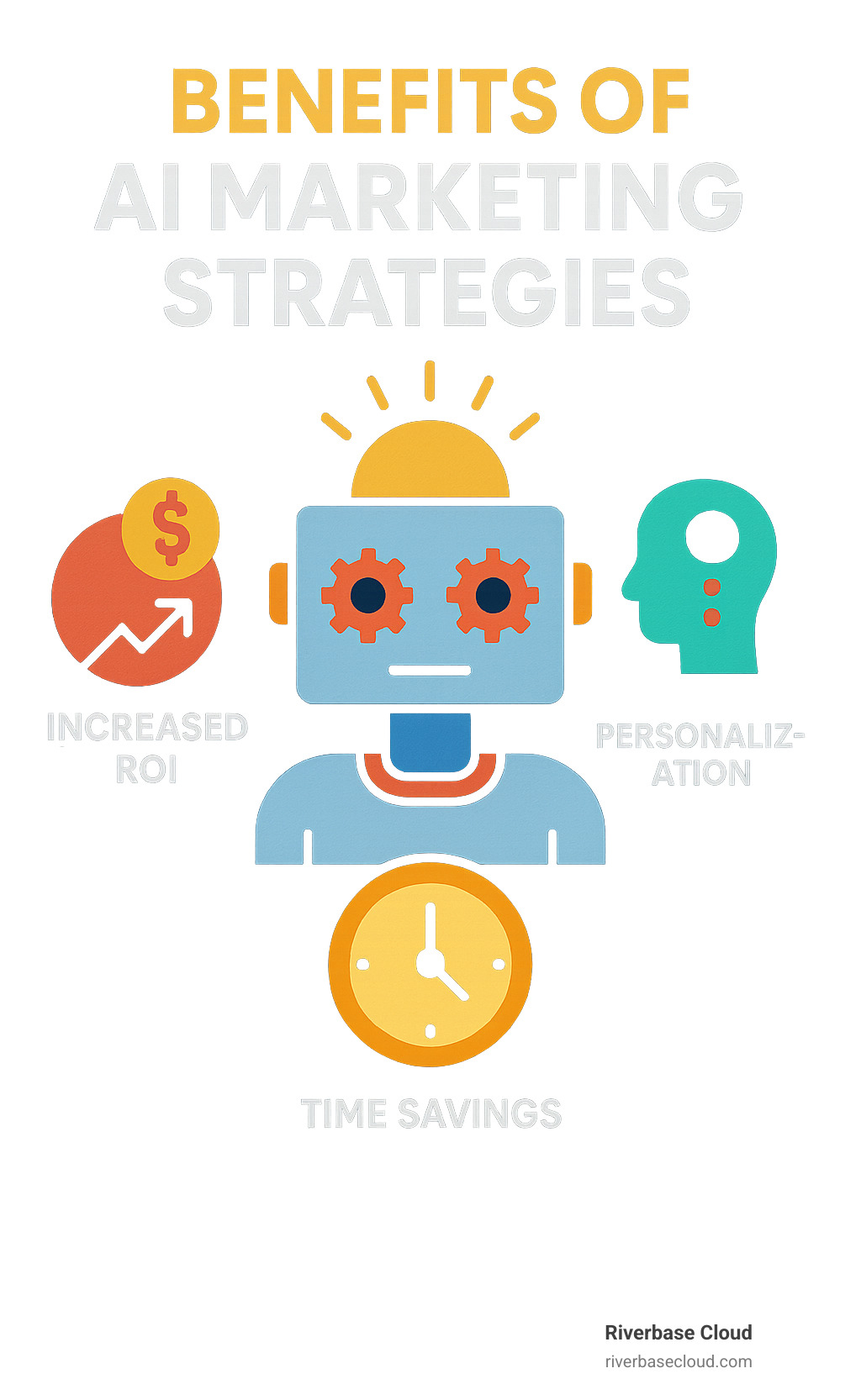
Faster decision-making is a game-changer in today's market. While a human analyst might take days to process campaign data, AI can do it in seconds, giving you insights when they're most valuable – right now, not next week.
The improved ROI speaks for itself. Our clients consistently see better returns when using AI marketing strategies because they're spending money more efficiently. AI helps identify which channels work best, which messages resonate most, and which customers are most likely to convert – all leading to smarter spending and better results.
Perhaps the most exciting benefit is improved customer personalization. Remember when personalization meant just adding someone's name to an email? Today's AI can analyze thousands of data points to create truly individualized experiences that make customers feel understood and valued. This isn't just nice to have – it drives real business results.
Marketing teams also love the operational efficiency AI brings. Those tedious, time-consuming tasks that used to eat up your day? Many can now be automated, freeing your team to focus on creative work and strategy – the human elements that truly differentiate your brand.
AI also provides valuable competitive intelligence, constantly monitoring what your competitors are doing and how the market is shifting. And the customer insights AI uncovers often surprise even the most experienced marketers, revealing hidden opportunities and unmet needs.
In a recent survey, marketing professionals highlighted what they value most about AI: 93% appreciate faster content creation, 90% love creating more personalized content, and 81% find AI helpful for generating fresh ideas.
What makes AI marketing strategies truly powerful isn't just what they can do – it's how they complement human creativity and strategic thinking. The best results come when innovative technology and human insight work hand in hand – something we've seen time and again with our clients at Riverbase Cloud.
Implementing AI in Your Marketing Strategy
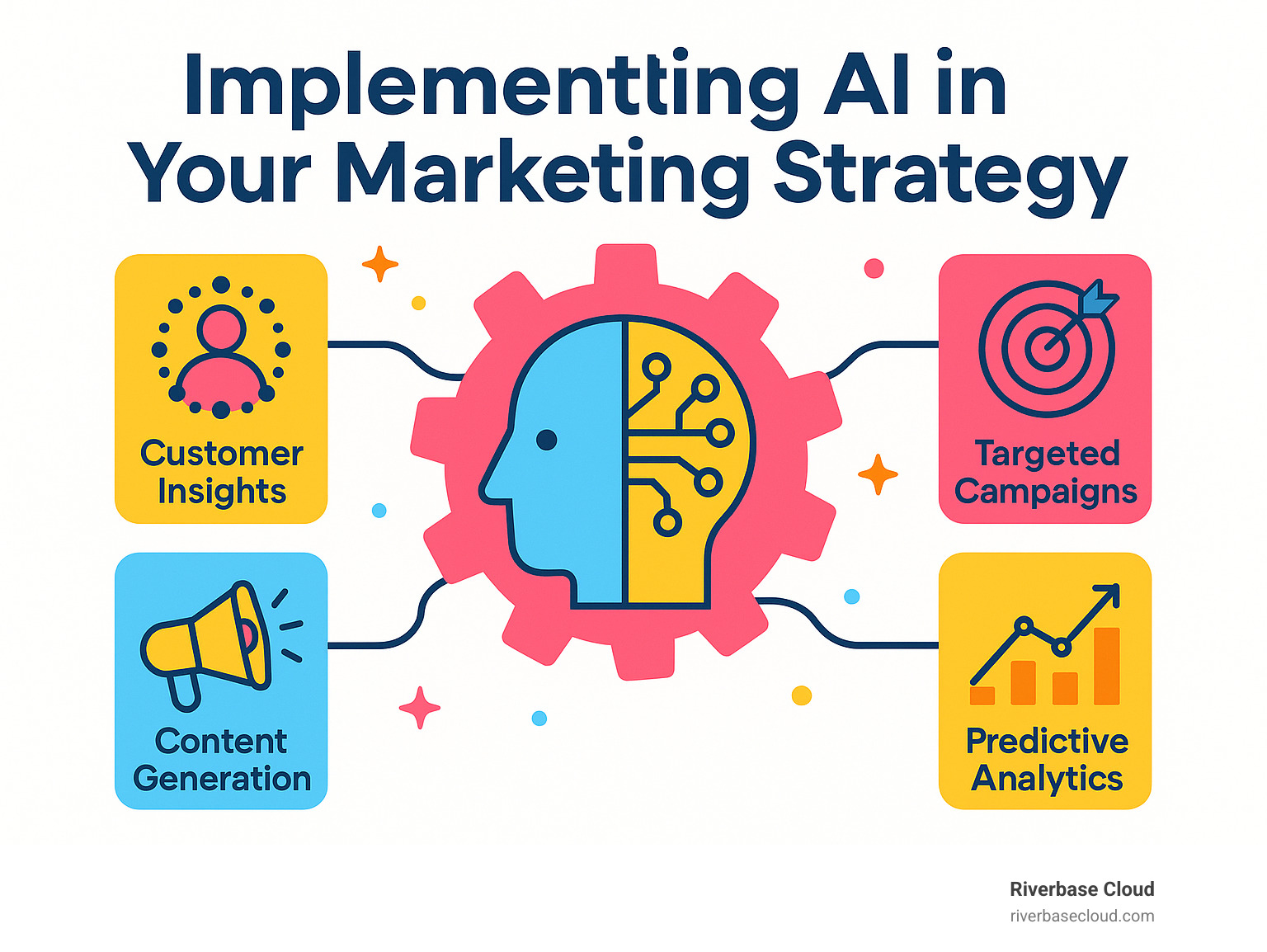
Bringing AI into your marketing isn't just about adopting fancy new tech—it's about thoughtfully integrating powerful tools that can transform how you connect with customers. Let's walk through how to make this happen in a way that feels natural and drives real results.
Step 1: Establish Clear Goals for AI Integration
Before jumping into the AI pool, take a moment to decide exactly what you want to achieve. Think of this as mapping your destination before starting the journey.
Are you hoping to boost customer engagement? Maybe you're looking to make your content more relevant to each reader. Or perhaps you want to squeeze more value from your marketing budget. Whatever your aims, being specific helps tremendously.
James Brooks has reported to have said that, 'Set very specific prompts. Tell the LLM exactly what you want: how you want them to write, what you want the outcome to be, how you want things formatted, what you do want, and what you don't want.'
This advice isn't just for talking to AI tools—it's about being crystal clear with your entire AI strategy. When we work with clients at Riverbase Cloud, we always start by setting measurable goals that connect directly to their business objectives. This keeps everyone focused on creating actual value, not just playing with shiny new technology.
Step 2: Data Collection and Management
AI is a bit like a chef—it can only make something delicious if you give it quality ingredients. In this case, those ingredients are data.
Quality matters immensely. Take time to ensure your customer information is accurate and up-to-date. Those duplicate entries and outdated email addresses? They'll only confuse your AI systems and lead to poor results.
Bringing data together from different sources creates a more complete picture of your customers. When you combine information from your website, email campaigns, social media, and sales records, you get insights that would be impossible from looking at any single source.
Privacy concerns can't be overlooked. With regulations like GDPR and CCPA gaining teeth, respecting customer data privacy isn't just nice—it's necessary. Make sure your data practices keep you on the right side of these laws.
The payoff for getting this right can be huge. McKinsey's research identified marketing as the area where AI delivers the greatest value, based on examining over 400 advanced use cases. One European telecom company created messaging that spoke to 150 different customer segments by using their data wisely—and saw dramatically better response rates as a result.
Step 3: Choosing the Right AI Tools and Platforms
With your goals clear and your data house in order, it's time to pick the tools that will bring your AI marketing strategies to life. This choice can feel overwhelming—there are so many options out there!
Think of this as finding the right members for your team. You want tools that align with what you're trying to accomplish, play nicely with your existing systems, and can grow alongside your business. The best tools are also intuitive enough that your team won't need a PhD to use them.
Support matters too. Even the most sophisticated AI tools hit snags sometimes, so knowing you can get help when needed provides peace of mind. And of course, the numbers need to make sense—the cost should be justified by the return you expect.
Some tools excel at specific tasks—Jasper AI and Writer for creating content, Surfer SEO for optimization, or Phrasee for crafting email subject lines that actually get opened. Others, like IBM Watson, offer broader capabilities for analyzing customer data and spotting trends.
At Riverbase Cloud, we've found that the magic happens when these powerful tools are guided by human expertise. AI can process mountains of data and spot patterns humans might miss, but it still needs our creativity, empathy, and strategic thinking to truly connect with customers.
| Traditional Marketing | AI-Driven Marketing |
|---|---|
| Manual audience segmentation | Automated, dynamic segmentation based on behavior patterns |
| Generic content for broad audiences | Personalized content custom to individual preferences |
| Fixed campaign schedules | Real-time optimization based on performance data |
| Intuition-based decision making | Data-driven insights and predictions |
| Linear A/B testing | Multi-variate testing with continuous optimization |
| Reactive customer service | Proactive engagement through predictive analytics |
The shift from traditional to AI-powered marketing isn't just incremental—it's transformative. Instead of making educated guesses about what your audience wants, you can know with increasing certainty. Rather than creating one-size-fits-all messages, you can speak to each customer as an individual. And instead of waiting weeks to know if a campaign worked, you can see results and make improvements in real time.
Remember though, the goal isn't to replace human creativity with algorithms—it's to free up your team to focus on the strategic and creative work that humans do best, while letting AI handle the data-heavy lifting. When these forces work together, that's when marketing truly shines.
For more insights on how AI delivers real value to companies, check out McKinsey's comprehensive research on this topic.
Top AI Marketing Strategies to Boost Your Campaigns
Now that we've covered the fundamentals of implementation, let's explore specific AI marketing strategies that can dramatically improve your campaigns' effectiveness.
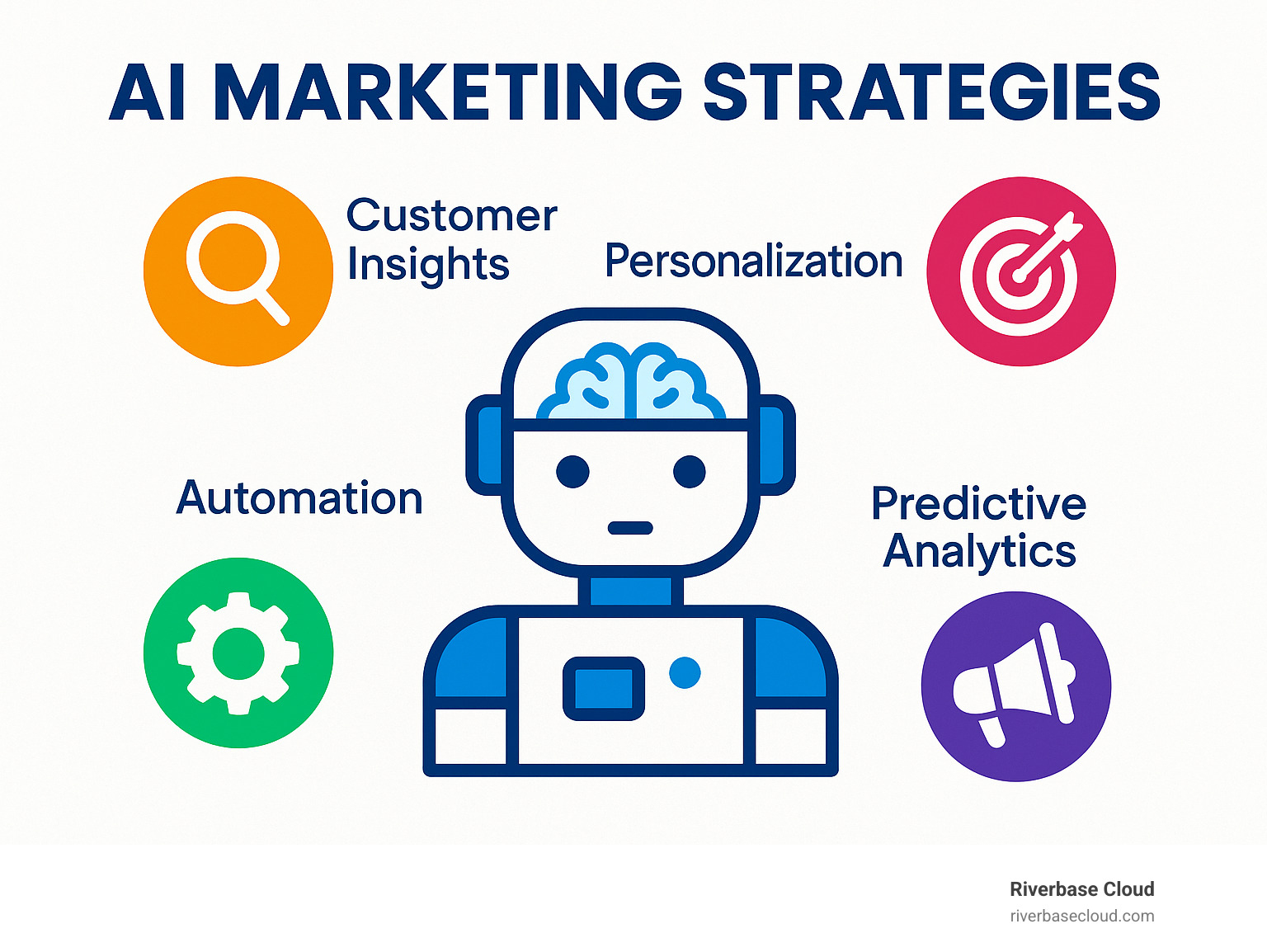
AI-Driven Personalization at Scale
Remember when getting a marketing email with your first name felt special? Those days are long gone. Today's consumers expect true personalization, and AI is making this possible at a scale we've never seen before.
Personalization has transformed from a nice bonus feature into an essential marketing strategy. The numbers speak for themselves – 96% of marketers report that personalized experiences significantly increase the likelihood of customers coming back for more.
What does this look like in practice? Take email campaigns, for instance. Using AI to analyze customer data doesn't just mean adding a first name to your email greeting. It means automatically generating entire email content that speaks directly to individual interests, crafting subject lines that grab attention, and even determining the perfect time to hit "send." One craft retailer we worked with boosted their personalization rate from a modest 20% to an impressive 95%, resulting in a 25% jump in click-through rates.
Website personalization gets even more interesting. Imagine visiting a site that rearranges itself based on your interests and behavior. Nike does this brilliantly with AI-powered style recommendations that adapt to each shopper's unique browsing history and purchase patterns.
Personalized advertising has also evolved dramatically. Coca-Cola's "Create Real Magic" campaign is a perfect example – they invited users to generate personalized artwork using AI tools. The result? Over 120,000 pieces of user-generated content with people spending an average of 7+ minutes engaging with the brand. That's marketing gold in an age of shrinking attention spans.
As Lauren Petrullo, an AI marketing expert, puts it: "The personalization that you can leverage with AI allows the consumer or the subscriber to feel like you're talking to them one-on-one versus one-to-many."
With Riverbase Cloud’s Ultimate Ads SaaS, you can boost your marketing with AI-driven ad creation and optimization. Our platform empowers businesses to deliver highly personalized ads to the right audience segments—at scale—while ensuring your brand’s message stays consistent. By blending advanced AI insights with your team’s creative direction, Ultimate Ads SaaS helps you achieve real engagement and measurable results.
For more insights on personalization strategies and implementation, check out IBM's comprehensive guide on personalization that explores both the technical and strategic aspects of this approach.
Leveraging Predictive Analytics in AI Marketing Strategies
If traditional marketing is like driving while looking in the rearview mirror, predictive analytics is like having a crystal ball on your dashboard. By analyzing historical data and identifying patterns, AI can now forecast future trends, customer behaviors, and campaign outcomes with remarkable accuracy.
Customer lifetime value prediction has become a game-changer for many of our clients. Rather than treating all customers equally, AI helps identify which customers will likely bring the most value over time. This allows for smarter allocation of marketing resources – focusing more attention on nurturing relationships with potential high-value customers from the earliest stages of their journey.
Churn prevention is another area where predictive analytics shines. AI can spot the warning signs that a customer might leave long before they actually do.
The most forward-thinking brands are using AI for trend forecasting too. Ben & Jerry's famously used AI to mine cultural data, which led to the development of their wildly successful "Ice Cream for Breakfast" product line. They spotted the trend before it went mainstream and positioned themselves perfectly to capitalize on it.
For retailers and restaurants, demand prediction has been revolutionary. Starbucks uses AI to predict demand patterns, helping individual stores manage inventory and staffing more efficiently. This not only reduces waste but ensures customers can get what they want, when they want it.
What makes predictive analytics so powerful is that it shifts marketing from being reactive to proactive. Rather than responding after the fact, businesses can anticipate needs and behaviors, staying one step ahead of both customers and competitors.
To dive deeper into how predictive analytics can transform your marketing approach, explore IBM's detailed resource on predictive analytics which covers implementation strategies and real-world applications.
Automating Marketing Processes with AI
Let's be honest – much of marketing involves repetitive, time-consuming tasks that drain creative energy. AI automation is changing this reality, handling the routine processes while freeing human marketers to focus on what they do best: creative and strategic thinking.
Content creation and optimization has been transformed by AI tools that can generate solid first drafts, optimize existing content for SEO, and suggest improvements for readability and engagement. Tools like Jasper AI have "read" approximately 10% of the internet and can generate content that aligns with your brand voice and marketing objectives. This doesn't replace human writers – it empowers them.
Social media management used to consume hours of marketers' time each day. Now, AI can schedule posts, recommend the best times to share content, generate fresh ideas, and even respond to common questions. We've seen clients reduce their social media management time by up to 75% through smart automation.
Email marketing automation has evolved far beyond basic scheduling. Today's AI tools can determine the optimal send time for each individual recipient, personalize content based on behavior patterns, and automatically segment audiences in increasingly sophisticated ways.
Behind the scenes, workflow automation is streamlining marketing operations by automatically routing tasks, setting priorities, and ensuring nothing falls through the cracks. This invisible infrastructure allows marketing teams to operate more efficiently than ever before.
A recent survey found that 67% of marketers cite faster content creation as the biggest benefit of AI – highlighting the significant time savings that automation delivers. But the real value isn't just in saving time; it's in redirecting that time toward higher-value creative and strategic work.
At Riverbase Cloud, our Managed-AI ADS service leverages AI automation to optimize ad campaigns across Google, Bing, YouTube, and LinkedIn. But we never let the machines run unsupervised. We maintain human oversight to ensure strategic alignment and brand consistency. This hybrid approach delivers both the efficiency of automation and the strategic nuance that only human expertise can provide.
Overcoming Challenges in AI Marketing Strategies
While the benefits of AI marketing strategies are substantial, implementation isn't without challenges. Understanding and addressing these obstacles is crucial for successful AI adoption.
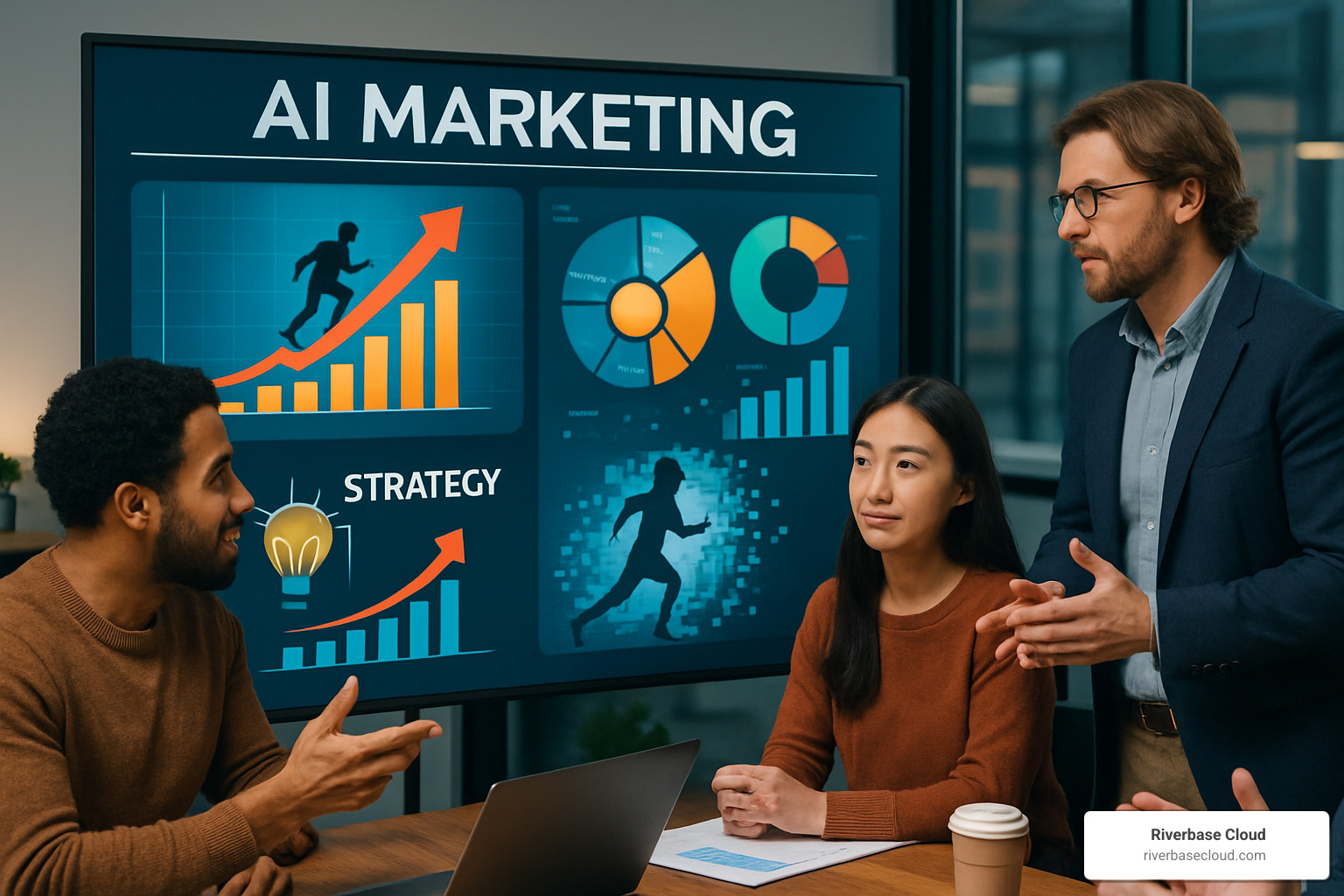
Addressing Data Privacy and Security
Let's face it – AI marketing runs on data, and that brings privacy concerns front and center. Today's consumers aren't just handing over their information without questions. They're savvy about how their data gets used, and regulations like GDPR and CCPA have raised the stakes considerably.
Building customer trust starts with transparency. When you clearly explain how you collect and use data, people feel respected rather than exploited. This means creating straightforward privacy policies that actually make sense – not just legal jargon that nobody reads.
Consent matters more than ever. Gone are the days of pre-checked boxes and hidden opt-outs. Modern AI marketing strategies need robust consent management that gives customers genuine control. This isn't just about compliance – it's about respecting your audience.
Security can't be an afterthought. With nearly half of businesses (49.5%) citing data privacy and ethics as their primary AI concern, implementing strong protection measures isn't optional. Regular security audits, encrypted data storage, and limited access controls form the foundation of responsible data management.
The privacy landscape keeps evolving, so staying current with regulations is essential. What was compliant last year might not be today. At Riverbase Cloud, we've built stringent data governance into every aspect of our Managed-AI solutions because we believe respecting privacy builds the lasting trust that drives business success.
Ethical Considerations in AI Marketing Strategies
Ethics in AI marketing goes beyond just following privacy laws – it's about doing what's right for your customers and your brand. The decisions you make today about how you implement AI will shape customer perception for years to come.
Algorithmic bias represents one of the most significant ethical challenges. AI systems learn from existing data, which means they can unintentionally perpetuate or even amplify existing biases. If your training data contains hidden prejudices, your AI might make unfair marketing decisions without you realizing it.
A diverse marketing team can help spot these biases before they affect your campaigns. Regular auditing of AI outputs helps ensure your marketing remains fair and inclusive to all audience segments.
Being upfront about AI use builds trust. When customers interact with a chatbot, they appreciate knowing they're not talking to a human. This transparency prevents the "uncanny valley" effect where people feel uncomfortable when technology tries too hard to seem human.
The line between effective persuasion and manipulation can blur when AI gets involved. Ethical AI marketing strategies aim to influence through value and relevance, not through exploitation of psychological vulnerabilities. This means avoiding dark patterns and manipulative tactics that might boost short-term conversions but damage long-term relationships.
"Ensuring the quality and accuracy of data is crucial"
This quote from an industry expert captures a fundamental truth. Poor data leads to poor AI decisions, which can result in inappropriate marketing that alienates customers. Quality data isn't just a technical requirement – it's an ethical one.
Human oversight remains essential, especially for high-stakes decisions. At Riverbase Cloud, we believe in AI-assisted marketing rather than AI-controlled marketing. Our approach keeps humans in the loop, applying judgment, empathy, and ethical consideration where algorithms cannot.
Accessibility often gets overlooked in the AI conversation. Ethical AI marketing strategies ensure that automated experiences work for everyone, including people with disabilities. This means designing AI interactions that accommodate diverse needs and abilities.
The best AI implementations don't just follow ethical guidelines because they have to – they do so because building respectful, inclusive marketing ultimately creates stronger customer relationships and better business outcomes. When done right, ethical AI marketing doesn't limit your effectiveness – it improves it.
Measuring Success of Your AI Marketing Strategies
After implementing AI marketing strategies, the real work begins. Success doesn't happen automatically—you need to measure results and continuously refine your approach. Let's explore how to effectively track performance and optimize your AI marketing efforts over time.
Tracking Key Performance Indicators
Measuring the impact of your AI marketing strategies requires looking at both traditional metrics and newer AI-specific indicators. The right KPIs will help you understand what's working, what isn't, and where to focus your efforts.
The most successful businesses track a balanced mix of metrics across different dimensions. Engagement metrics like open rates, click-throughs, and time spent with content reveal how effectively your AI-driven campaigns capture attention. Are people actually engaging with that personalized content your AI created? These metrics tell the story.
Beyond engagement, conversion metrics show how well your AI initiatives move customers through your funnel. This is where the rubber meets the road—are those clever AI-generated emails actually turning prospects into customers?
I've seen how powerful measuring personalization effectiveness can be. One of our clients at Riverbase Cloud was skeptical about AI personalization until we showed them the 27% lift in conversions compared to their generic content. Those numbers made them believers overnight!
Don't overlook efficiency metrics either. AI should be saving your team time and resources. One European telecommunications company we worked with tracked both performance improvements and time savings—they saw a 41% jump in response rates while cutting campaign creation time in half. That's the kind of double-win that makes AI investments worthwhile.
Of course, the bottom line matters most to many businesses. ROI metrics help you quantify the direct financial impact of your AI implementations. Are you getting back more than you're putting in? These numbers help justify continued investment in AI technologies.
Finally, never forget that customer satisfaction is the ultimate goal. Customer satisfaction metrics like Net Promoter Score and retention rates reveal whether your AI-improved marketing is actually building stronger relationships or just creating tech-enabled noise.
Our Dashboard Analytics service at Riverbase Cloud brings all these metrics together in one place, giving you a complete picture of your AI marketing performance. We believe you can't improve what you don't measure—and effective measurement is the foundation of marketing success.
Continuous Optimization with AI
One of the most exciting aspects of AI marketing strategies is their ability to get smarter over time. Unlike traditional campaigns that remain static once launched, AI systems can continuously learn and improve with each interaction.
A/B testing at scale becomes dramatically more powerful with AI. Rather than testing just one or two variations, AI can analyze countless combinations of headlines, images, offers, and audience segments to quickly identify winning approaches. One craft retailer we worked with tested 32 different content variations simultaneously—something that would have been logistically impossible without AI—and saw engagement jump 38% as a result.
The real magic happens when you implement automated campaign adjustments. Modern AI systems can shift budget allocation in real-time, moving resources to the channels and audiences that are performing best. This dynamic optimization happens faster than any human could manage manually, ensuring your marketing dollars always work as efficiently as possible.
Content optimization is another area where continuous improvement shines. AI tools can analyze which content elements drive engagement and conversions, then suggest refinements that improve performance. This isn't about replacing creative teams—it's about giving them data-driven insights to make their work more effective.
Your audience understanding should evolve over time too. Audience refinement through AI helps you find new segments, identify shifting preferences, and adapt to changing behaviors. What worked last month might not work next month, and AI helps you stay ahead of these changes.
Don't forget the human element in this process. Feedback loops that incorporate customer comments and team insights ensure the AI doesn't operate in a vacuum. At Riverbase Cloud, we firmly believe that while AI excels at incremental improvements, humans provide the creative leaps and strategic shifts that lead to breakthrough performance.
The best approach combines AI's analytical power with human creativity and judgment. Your AI systems handle the data-crunching and pattern recognition, while your team focuses on strategy, creativity, and relationship building. This partnership between human and machine delivers results neither could achieve alone.
Optimization isn't a one-time event—it's an ongoing journey. The businesses seeing the greatest success with AI marketing strategies are those that accept this continuous improvement mindset, using each campaign as an opportunity to learn and grow.
Conclusion
The marketing world is changing before our eyes, with AI marketing strategies leading this exciting evolution. Throughout this guide, we've seen how AI offers remarkable opportunities to connect with customers in ways that simply weren't possible before. From creating deeply personalized experiences to predicting what your customers want before they even know it themselves, AI is reshaping what's possible in modern marketing.
But as we've discussed, successful implementation isn't just about jumping on the latest tech bandwagon. It requires thoughtful planning and a strategic approach. You need clear objectives that align with your broader business goals. You need clean, well-organized data that AI can learn from. You need the right tools that fit your specific needs. And importantly, you need to address privacy concerns and ethical considerations that come with these powerful technologies.
At Riverbase Cloud, we're passionate about helping small and medium-sized businesses harness AI's power while maintaining that essential human touch. Our Managed-AI solutions don't just implement technology and walk away – we combine cutting-edge AI with expert human oversight to ensure you get real results that align with your unique business needs.
Whether it's optimizing ad campaigns with Managed-AI ADS, creating engaging content with Managed-AI CONTENT, or improving your local search presence with Managed-AI LOCAL, our approach always puts your business goals first. We believe that while AI accelerates growth, it's the human touch that ultimately drives success.
That's why we've built our services to be flexible, transparent, and commitment-free. We understand that implementing AI marketing strategies can feel overwhelming, especially for smaller businesses without dedicated AI specialists in-house. Our job is to make this powerful technology accessible and effective for you, without the complexity or risk.
The goal isn't to use AI for its own sake. It's about leveraging these tools strategically to improve your marketing effectiveness, efficiency, and customer relationships. When implemented thoughtfully, AI becomes a powerful competitive advantage that helps you stand out in today's crowded marketplace.
Curious about how AI can lift your marketing strategy? Explore our Dashboard Analytics services to see how we help you measure, optimize, and succeed with AI-driven marketing. If you’re ready to take the next step, book a call with our experts—we’ll guide you through every stage of your AI marketing journey, making it simple and effective.
